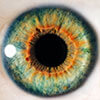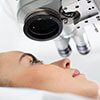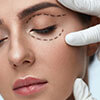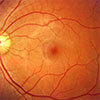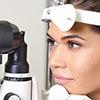Recurrent Erosion Syndrome & Surgery
Weakened Cornea Contributes to Recurrent Erosion
Recurrent erosion syndrome is a condition in which eye irritation or pain occurs upon awakening, or causes you to wake up in the middle of the night. The pain may be associated with blurred vision and watering of the eye.
Symptoms usually improve within several hours, and may recur daily. The symptoms may subside, only to begin again after several weeks or months have passed.
Recurrent erosion syndrome may be genetic and/or occur in eyes that have previously sustained trauma such as a corneal scratch or abrasion. When the cornea (the front clear part of the eyeball) heals, the superficial cell layer does not heal normally. This abnormal healing leads to a weakness in the surface layer of the cornea. Sometimes people are born with a weakness in the superficial cell layer of the cornea. This is called anterior basement membrane dystrophy.
The weakness in the superficial layer of the cornea predisposes it to tear away from the eye, leading to a corneal abrasion. This corneal abrasion causes the symptoms of recurrent erosion syndrome. The symptoms occur at night or upon awakening because the eyelid tears away the surface of the cornea when you open your eyes.
Drops, Surgery Resolve Corneal Abrasion
The doctors at Northwest Eye Surgeons begin treatment of recurrent erosion syndrome with lubricating eye drops and ointments. This prevents the friction between the eyelid and the cornea.
What are Corneal Abrasions
If drops don’t work, then surgical treatment may be considered. The most effective treatment for recurrent erosion syndrome is with a laser called phototherapeutic keratectomy, or PTK.
PTK treatment removes the abnormal surface layer of the cornea, and then uses a laser to resurface the cornea underneath. When the surface layer grows back, it’s stronger, and doesn’t have the weakness that caused the recurrent erosion syndrome.
The doctors at Northwest Eye Surgeons can determine which treatment is best for you after careful examination of your eye and consideration of the severity of your condition.



